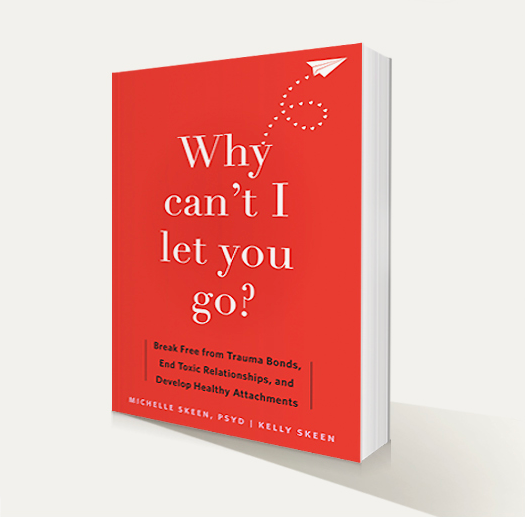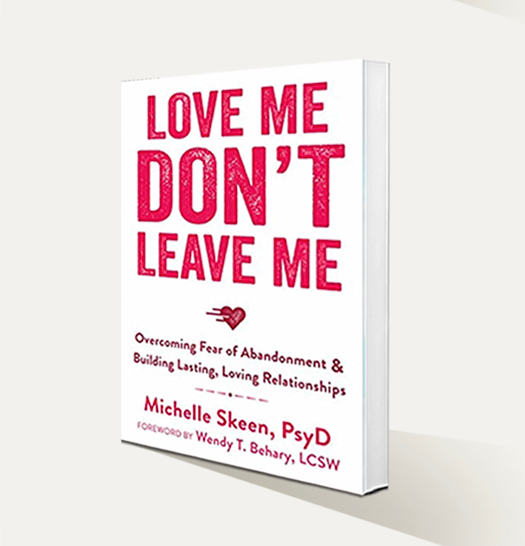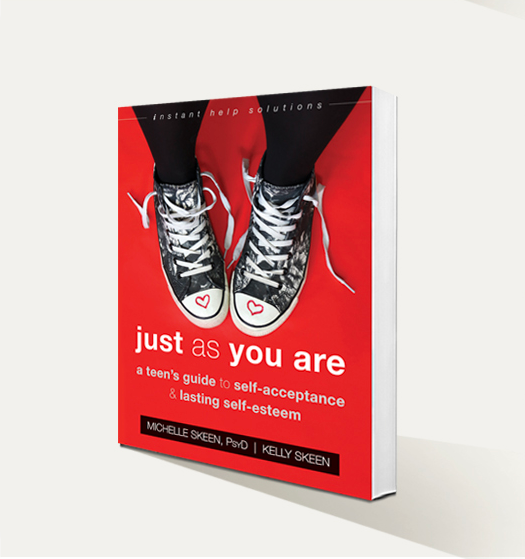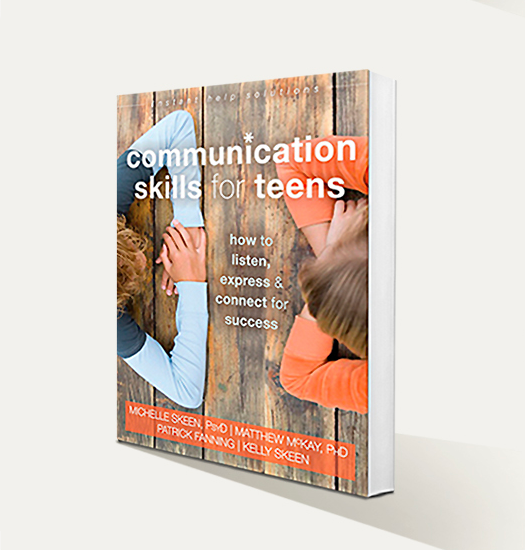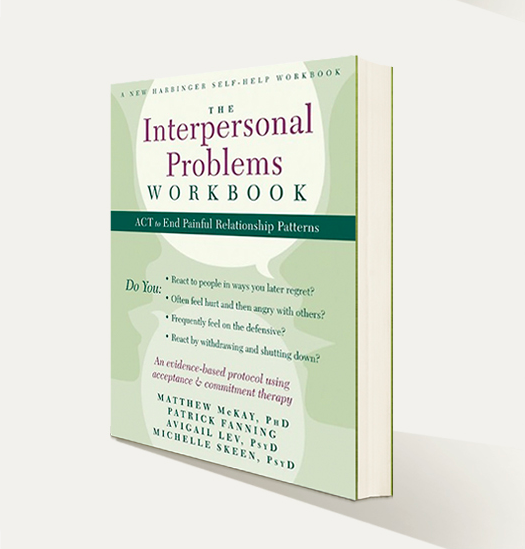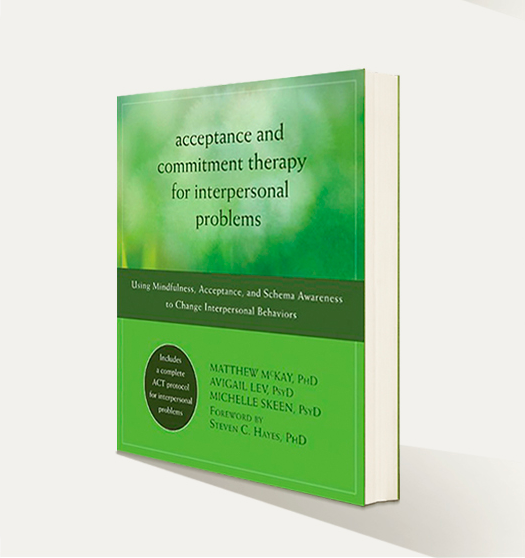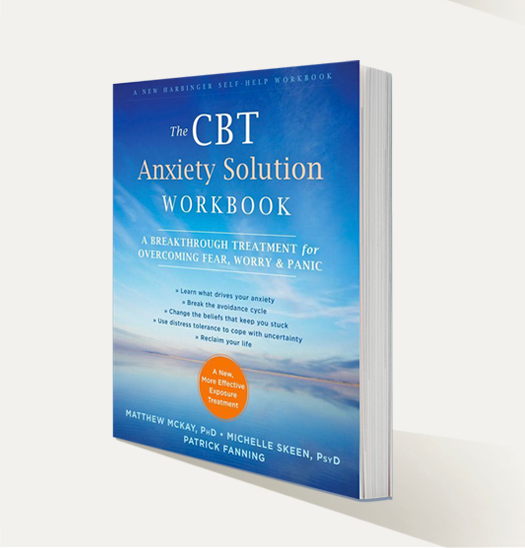Radio show on Thursday November 1, 2018
This week on Relationships 2.0 my guest host is Shawn T. Smith PsyD who interviewed me about my book Love Me Don’t Leave Me: Overcoming the Fear of Abandonment & Building Lasting, Loving Relationships
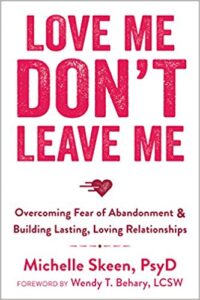 About the book: Everyone thrives on love, comfort, and the safety of family, friends, and community. But if you are denied these basic comforts early in life, whether through a lack of physical affection or emotional bonding, you may develop intense fears of abandonment that can last well into adulthood―fears so powerful that they can actually cause you to push people away. If you suffer from fears of abandonment, you may have underlying feelings of anger, shame, fear, anxiety, depression, and grief. These emotions are intense and painful, and when they surface they can lead to a number of negative behaviors, such as jealousy, clinging, and emotional blackmail. In Love Me, Don’t Leave Me, therapist Michelle Skeen combines acceptance and commitment therapy (ACT), schema therapy, and dialectical behavioral therapy (DBT) to help you identify the root of your fears. In this book you’ll learn how schema coping behaviors―deeply entrenched and automatic behaviors rooted in childhood experiences and fears―can take over and cause you to inadvertently sabotage your relationships. By recognizing these coping behaviors and understanding their cause, you will not only gain powerful insights into your own mind, but also into the minds of those around you. If you are ready to break the self-fulfilling cycle of mistrust, clinginess, and heartbreak and start building lasting, trusting relationships, this book will be your guide.
About the book: Everyone thrives on love, comfort, and the safety of family, friends, and community. But if you are denied these basic comforts early in life, whether through a lack of physical affection or emotional bonding, you may develop intense fears of abandonment that can last well into adulthood―fears so powerful that they can actually cause you to push people away. If you suffer from fears of abandonment, you may have underlying feelings of anger, shame, fear, anxiety, depression, and grief. These emotions are intense and painful, and when they surface they can lead to a number of negative behaviors, such as jealousy, clinging, and emotional blackmail. In Love Me, Don’t Leave Me, therapist Michelle Skeen combines acceptance and commitment therapy (ACT), schema therapy, and dialectical behavioral therapy (DBT) to help you identify the root of your fears. In this book you’ll learn how schema coping behaviors―deeply entrenched and automatic behaviors rooted in childhood experiences and fears―can take over and cause you to inadvertently sabotage your relationships. By recognizing these coping behaviors and understanding their cause, you will not only gain powerful insights into your own mind, but also into the minds of those around you. If you are ready to break the self-fulfilling cycle of mistrust, clinginess, and heartbreak and start building lasting, trusting relationships, this book will be your guide.
About the author: Michelle Skeen, PsyD, has a doctorate in clinical psychology. She is author of seven books, all designed to enhance relationships by emphasizing the importance of identifying core values and valued intentions, limited thinking, mindfulness, self-compassion, empathy, and effective communication and conflict resolution skills. Her passion is coaching individuals in creating and maintaining healthy relationships by bringing awareness to obstacles (fears and beliefs), which often work unconsciously to limit connections with others. Michelle believes that an early introduction and education in core values and healthy communication are essential life skills for success. To that end, Michelle and her daughter, Kelly, coauthored Communication Skills for Teens and Just As You Are. Skeen completed her postdoctoral work at the University of California, San Francisco. She codeveloped an empirically validated protocol for the treatment of interpersonal problems that resulted in two books: Acceptance and Commitment Therapy for Interpersonal Problems and The Interpersonal Problems Workbook. Michelle’s work has appeared in more than thirty publications around the world. She hosts a weekly radio show called Relationships 2.0 with Dr. Michelle Skeen that airs nationally. To find out more, visit her website at www.michelleskeen.com.
Love Me Don’t Leave Me Part Two – The Dating Years
blogher.com
by datewithlucy.com
In part one of Love Me Don’t Leave Me, I write about how close to the bone several of the toxic childhood schemas were for me and the general effect of issues thereof for many years. I mention my current strong, healthy relationships – thank God – and how I got married as one person and got divorced as another when I’d salvaged enough of my true self from my primary pain. What I didn’t delve into was how, until recently, I feel “my story” was a third wheel on most of my dates. #Goodfuckingtimes.
To begin, it’s incredible to me how I’ve changed since I went back on POF the second time as a born again virgin. Certainly, I’d advanced greatly since the first time when I was on for six weeks which felt like six MONTHS and I was so scarred from the experience I vowed: “Never again!” Well, never came sooner than expected as it often does.
Was I actually ready to date online? Don’t be ridiculous. That’s like asking: Were you ready to be a mother? Of course you say “yes!” Then you spend the rest of eternity dating/ mothering and asking yourself: “Was I on CRACK COCAINE??” But I’d been so lonely I was at least ready to try. And try. And try again. I’ve been on a hella lot of first dates, kids. Just saying.
When I began treading water once more in the POF pool, I was my usual take everything personally/ serious as a heart attack self. Therefore, every message that went nowhere, every interaction that disappointed was an opportunity for me to ask: “what’s WRONG with me??” always seeing the inbox as half full. I had no idea how to be easy going or take things lightly – LIGHTLY?? Get a grip, man! Life is hard and then you die. Probably on a horrible first date. Get with the program.
Also, I’ve never been a natural with the opposite sex, to be honest. I’ve always felt awkward, with low self esteem and little confidence in my attractiveness or personality. Growing up, I was never told I was pretty or smart or a good person; I never felt valued for any reason. I only got attention when I got in trouble, which wasn’t very often because I was always trying to be sooo good…to get some fucking attention!
This is why my “emotional deprivation” score in Love Me Don’t Leave Me, though only “fairly low”, was my highest of all the questionnaires in the book. “If you grew up in an environment where you didn’t receive emotional support, attention, affection, guidance and understanding, then emotional deprivation is probably one of your core beliefs.” I highlighted “your feelings or experiences weren’t valued or validated.” No shit, Sherlock. Add a big scoop of “defectiveness” and a healthy pinch of “failure” and there’s my flavor profile growing up.
My parents were negative people and early on, I internalized all of that negativity as guilt and blame, taking responsibility for things I had no control over yet I still managed to feel Iike I had a big L on my forehead. When you combine a sensitive kid with highly insensitive, emotionally unavailable parents, you get a version of me – I’ve always been able to give love easily but I was given very little practice receiving it, therefore I never felt I deserved it. Fast forward, put all of that in a cute dress and out in the big bad world online to find a new mate at 50 years old…hahaha…YEAH, right?
It’s been over two years now on this journey learning about myself and finally I can look back and see a pattern and feel how intensely my core beliefs were manifesting as knee jerk reactions to commonplace events. Hello, amygdala hijack! As a big example, whenever it took longer than I thought it should ie immediately to hear back from someone via email or text, I’d immediately assume something was wrong and blame myself. I said something wrong. I did something wrong. OMG. I knew I shouldn’t have said/ done that! WHY did I say/ do that?? Even if it was the most innocuous of communications, I felt like I was on a tightrope of human etiquette. Blindfolded. The highs were very high when an interaction went well but the lows were sooo low because everything felt so random. I was so random. And as much as I tried to be open to love, in hindsight I see that I still felt unlovable to myself – always not good enough. Jesus. The “unavoidable and uncontrollable primary pain”. Brutal.
But. As Michelle says and I finally began figuring out, I am NOT my story. My parents did what they could and I stopped blaming them years ago; however, I’m trying my damnedest to stop blaming MYSELF now and holy shit – is THAT a lot nicer place to live from let alone date!
How did I get here from there, you ask? Really, it’s been hard core hands on trial and error. It took a good while before it became self-evident that while the guys would come and the guys would go, it was still me in the mirror every day and I just wanted to be happy. Comprehending that my life was about me was gradual and then it was like a thunderbolt. MY LIFE IS ABOUT ME. Did I want to spend it treating myself like shit while I treated everyone else I loved like gold? Really?
I understood how much I’d changed when I went on a potential fwb meet a few months ago which was the oddest non-date date I’d ever been on. Seriously. We were like seatmates on a plane for three hours. About thirty minutes into this weirdness I thought: “Wow. This reaallly isn’t going well, is it?” But I thought it with complete detachment and I made no heroic leap to try and save it or take responsibility for it. At. All. In fact, I sat back and waited for him to make an effort and when it was not forthcoming I went: Huh. And then just let it all happen.
That moment was revelatory to me. COMPLETELY. I was no longer trying to please my date as my date had no interest in pleasing me. The date was DIVE BOMBING…and I didn’t take ANY OF IT personally. At all. It was fan. fucking. tastic! Take THAT, you fucking failure core belief, you!
In fact, doing a stint on a fwb site after spending six months with Mr. Sooo Sexy and Sooo Damaged was just what the doctor ordered and no, I don’t mean the 21 year old with the 10 minute turn around though that WAS fun. It was just me finally taking things as easily as an afterthought. Messages came and went. Guys came and went. Sometimes I was a little bit sad or disappointed that someone didn’t work out but then I just let it go and moved on. If I didn’t hear back from someone, I no longer castigated myself. The sheer luxury of not rearranging everything negatively then putting it all on my shoulders was unparalleled. I actually FORGOT some guys because…well…they weren’t very memorable, obviously. That was unheard of before! I usually have the memory of an elephant…and usually only for the bad shit.
Maybe it’s Alzheimer’s? But hopefully, it’s just me being happy no matter how the dating goes or doesn’t.
Hopefully, it’s just me being the sky and not the weather. Hopefully, it’s just me becoming ME. Story not required.
Did I have Love Me Don’t Leave Me at the beginning of my dating journey? Nope. Would it have helped? Yup. Often, just trying to identify and articulate the root of your pain is overwhelming and will stop you in your exhausted tracks. I found this book to be clear and accessible, both in language and in practical tools, and at times actually conducive to personal epiphanies. Ftw.
Make no mistake – you will still have to do all the work and it’s no fucking picnic in the park but again, it’s your life. Not what your parents made it. Not what a random date can more than momentarily affect. YOURS. If you’re not all: “My life fucking ROCKS!! I fucking rock!!” then maybe it would benefit you to bone up on maladaptive schemas, amygdala hijacking and the difference between primary and secondary pain and by maybe I mean yes, completely.
Then none of us will have to yell: LOVE ME DON’T LEAVE ME! at anyone. That would be a good thing, amiright?
Read it on blogher.com
Love Me Don’t Leave Me – A Book Review and My “Story” Part One
blogher.com
by datewithlucy.com
So. A few months ago, suddenly Susan, I was asked if I would review a book about overcoming childhood abandonment issues to build lasting, loving relationships by Michelle Skeen, PsyD disconcertingly named: “Love Me Don’t Leave Me”. Honestly, I do understand the value of a catchy title but this one had me picturing myself blurting out those words as my first date got up to go to the washroom. Never to return. I’ve not yet had the urge but then I’ve only been online for a couple of years. ONLY. Check back with me in another chunk of time if I’m still single and dates are thin on the ground, I’m just saying. ThinnER.
But. Let me reassure you, when I actually read the book, I found it to be insightful and thought provoking. Michelle basically posits that many of us are affected by toxic childhood schemas or core beliefs ie “frameworks that help organize and make sense of information and the things around us.” Because they’re by nature definitive, “black or white/ negative or positive and serve as a predictor even in the absence of all the information”, when negative schemas get activated, we go into protective fight, flight or freeze mode. ( Fyi, I’m a freezer. Big time. Curses. ) Then something termed “the amygdala hijack” happens. Love that term btw, coined by Daniel Goleman in his book Emotional Intelligence ( 2006 ) However, I don’t love what it means: “when we experience powerful emotions like fear it overwhelms our rational thoughts and this can lead to behavior that is harmful to us rather than helpful.” #ThatsNeverGood
The primary maladaptive core belief covered in this book is of course abandonment with four other basic, closely correlated schemas: mistrust and abuse, emotional deprivation, defectiveness and failure. All of these come from Jeffrey Young PhD’s concept of early maladaptive schemas/ EMS. Fascinating. It’s like an emotional train wreck you can’t stop looking at because hello…you’re in there somewhere. I found myself snug within emotional deprivation myself with a lifelong pass to defectiveness and failure in the adjoining cars. AMAZING!
There’s questionnaires you go through to number your experiences from “1 to fuck, that’s so me” and while my numbers were low, I recognized key statements as being deep within my own psyche and definitely from my own childhood. Not that they were news, mind you. I’ve known this shit for DECADES. Known that they’re embedded remnants of growing up emotionally neglected and always feeling less than, never feeling loved and lovable just because. Always striving to earn love because I figured out at a very young age it wasn’t just lying around for free, dude! Not in my Asian household. And taking on blame for anything and everything because being unlovable was obviously my own fault, wasn’t it? I mean, as a kid I was sooo eager to please, just dying for some attention…PLEASE! And yeah no. Not so much.
How has this affected my connections with the people in my life right now? Well, to be honest, I became estranged from most of my family when I split from my ex husband but I have excellent relationships with my son and my friends. It’s probably the decades of working on letting go of the past and choosing who I want to be, regardless of the baggage I grew up with, and of course wanting to be the exact opposite of the mother I had. But the relationship I have with myself and how that’s been played out on the dating field? THAT’S a lot more conflicted. My daily challenge is to be as kind and loving to me as I am to everyone else in my life. Daily. CHALLENGE.
We ALL have stuff. Obviously. And was I that dying to please/ do anything for your approval/ yes, I’ll take blame for $1000, Alex! adult for many many years? HELLO. Am I still?? Less. But. I’m not going to lie; it’s a going concern. It’s also life. We all have our stuff.
However, as Michelle says and which totally resonated with me: we also all have a story but we don’t have to BE our story. In other words:
“You can’t change your core beliefs, you can’t really change what triggers your core beliefs and you can’t change the feelings that surface. But you CAN change your behavioural reactions.”
Here’s how I used to manifest my story/ who I was when I was with my ex husband from the tender and achingly naïve age of 24 until the “I’m ready to be my own person now, fuck the consequences” departure age of 42:
We got engaged a year and a half after dating/ living together and the next morning in the shower, I started sobbing. SOBBING. I never thought anyone would love me enough to marry me. Literally. When I was little, I would dream of having three children but I could never imagine getting married. I thought I would die of cancer before this would ever happen – I guess so I wouldn’t have to live my entire life knowing I wasn’t loveable enough to be with until death do part. How. Fucked. Was. That. Emotionally deprived/ defectiveness/ failure schemas much?
So. After you identify what you feel are the core beliefs that are holding you back, the book goes on to give you practical tools to understand and work with what you’ve been given. For example, Michelle describes “creative hopelessness ie accepting unavoidable pain” and says while the primary pain of the human condition is “unavoidable and uncontrollable”, “we have the power to eliminate the secondary pain we create to try and avoid or control our primary pain.” Which, as I repeat, is UNAVOIDABLE AND UNCONTROLLABLE. This is good news, people! If you accept this and accept that you CAN change your behavior in reaction, it’s a start! That and imagining that “you are the sky and not the weather” – letting negative thoughts pass through you like clouds pass by overhead. Honestly? I love that analogy. It makes sense to me. It helps me.
Obviously, I recommend “Love Me Don’t Leave Me”, questionable title and all. It’s for anyone who feels like they’ve been a little or a lot fucked over by their dysfunctional childhoods so yeah…pretty much everyone. It’s not about assigning blame but looking at the situation with new eyes and new concepts of why you’re fucked up and tools about how to not be AS fucked up. #Ftw.
At the end of the forward, Michelle says:
“I wear a bracelet that reads ‘it matters not what road you take but what you become on the journey’.”
As Lucy, I’m all about who I’m becoming on my path of discovery and self-empowerment so yeah…Michelle is obviously one of my tribe and her book is totally worth the read and the work it entails thereof because YOU’RE totally worth it. Amiright?
Ps I knew when I finally got around to writing this post after cogitating on it for many weeks that it would probably be a two parter. I’ve been really letting it soak in and connect with my own issues to see what came up/ what I would eventually write. It may appear I choose my topics but I’m just a channel really – I sit down with an idea and words come out. This is what came out: Life in general is part one; dating in particular is part two.
Stay tuned. The damage control continues. HA!
Read it on blogher.com
Guest for my radio show on Tuesday August 6, 2013
My guests this week on Relationships 2.0 are co-authors Michelle Skeen (yes, I will be host and guest) and Avigail Lev discussing our book The Interpersonal Problems Workbook: ACT to End Painful Relationships Patterns (co-authored with Matt McKay and Patrick Fanning).
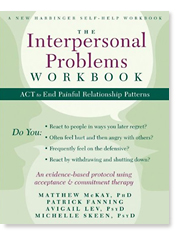 About the book:
About the book:
Do you often lash out at people? Do you let your emotions rule your interactions with others? Do you find it difficult to see things from others’ point of view? You are not alone. Despite the fact that we all have to deal with other people our daily lives, many of us have difficulties with interpersonal relationships.
Written by psychologist and bestselling author Matthew McKay, The Interpersonal Problems Workbook combines research and evidence-based techniques for strengthening relationships in all areas in life—whether it’s at home, at work, with a significant other, a parent, or a child. The skills in this workbook are based in both schema therapy and acceptance and commitment therapy (ACT), and are designed to help you connect and communicate effectively with those around them.
ACT has been proven effective in helping people improve their relationships with others. The ACT skills detailed in this book include present moment awareness, diffusion, and flexibility—all of which will help you to improve your relationships with others. In this book you will learn what your schema is, and how to act on your values to communicate and get along with others.
If you are ready to stop building walls and start connecting with those around you, this book presents powerful, effective tools for change.
About the coauthor:
Avigail Lev, PsyD, maintains a private practice in Berkeley, CA. She specializes in couples’ therapy and also treats individuals who struggle with interpersonal problems, anxiety, trauma, chronic pain, and mood disorders. She has provided supervision, trainings, and workshops utilizing cognitive behavioral therapy (CBT) and is the coauthor of Acceptance and Commitment Therapy for Interpersonal Problems.
Sh*t happens: dealing with your emotions and improving your relationships
This story begins and ends in my kitchen. It doesn’t involve cooking, but it does include a recipe for how to improve your relationships in the New Year.
The morning of the 30th I walked into my kitchen to make coffee and I stepped in a big pile of dog sh*t (thank you Lucy!). This is an unusual event and an important reminder that “sh*t happens.” Also, a reminder of the consequences associated with eating too many holiday treats. Oh, I should mention that I was barefoot. Hilarious!
Sh*t is always going to happen—sometimes it is expected and other times it comes as a surprise. We don’t have as much control over these events as we do over how we respond to them. Many times our reactions make the situation worse. We all experience emotional pain…it is unavoidable. This unavoidable pain is the result of our early experiences and the core beliefs (schemas) that formed as the result of these experiences. When we have an experience and our core beliefs get triggered the pain that we feel is called primary or schema-related pain. When we try to avoid the primary pain with unhealthy coping behaviors (schema coping behaviors) we create additional pain. This is the pain that we can eliminate thereby ultimately minimizing the primary pain. Our unhealthy coping behaviors hurt other people, relationships, and ultimately we are hurting ourselves. Sometimes these behaviors can make us feel like we are blocking or controlling the pain but the unhealthy coping behaviors only offer temporary relief in the moment—in the long run they can contribute to our primary pain.
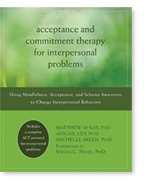 Here is an example to illustrate what I’ve just described (below are excerpts from ACT for Interpersonal Problems: Using Mindfulness, Acceptance, and Schema Awareness to Change Interpersonal Behaviors by McKay, Lev and Skeen):
Here is an example to illustrate what I’ve just described (below are excerpts from ACT for Interpersonal Problems: Using Mindfulness, Acceptance, and Schema Awareness to Change Interpersonal Behaviors by McKay, Lev and Skeen):
Beth has a core belief that she is defective—not good enough, unworthy. Here is an excerpt of a dialogue between Beth and her therapist:
Therapist: There are a couple of triggering situations with your husband: when he criticizes something you do, and when he seems kind of clipped, cold, and uncommunicative.
Beth: Yes. I feel vulnerable with him.
Therapist: Because he can trigger that feeling of unworthiness—the defectiveness schema, the sense that you’re somehow wrong or bad?
Beth: Right.
Therapist: So let’s look at how you cope. When he criticizes, you counterattack—you get angry and talk about all the things he does wrong. But when he’s cold and withdrawn, you find yourself clinging and demanding attention. Those are two very different coping responses.
Beth: When he criticizes, I feel hurt…and ashamed. And I can’t stand that, so I blow up. But his withdrawal is scary. I feel like he’s getting sick of me. So I try to pull him close.
Therapist: When you use those schema coping behaviors—getting angry or trying to pull your husband close—does it make you feel better or worse?
Beth: I guess I feel better at first. When I lash out, I don’t feel as bad about myself. And when I get clingy and demanding, I feel like I’m holding on to him, so I’m a little less scared.
Therapist: And then what? Does the schema coping behavior continue to help you?
Beth: No. He gets annoyed, and then I feel like something has gone wrong between us.
Therapist: So the coping behavior helps in the short term, but after a while…
Beth: Yeah. I feel like I’m screwing things up.
Therapist: So the coping behaviors aren’t a long-term solution. They seem like they might even strengthen that old schema—the sense of being unworthy.
You can see how Beth’s unhealthy coping behaviors are actually re-enforcing her core belief that she is defective.
Now that Beth recognizes that her coping behaviors are not eliminating the pain or improving her relationship she can move on to the next step which is a critical step in Acceptance and Commitment Therapy—creative hopelessness. Creative hopelessness marks the moment when we recognize that our unhealthy coping behaviors (experiential avoidance) aren’t making our relationships or us better. Everything that we’ve tried in order to control and minimize the primary pain (schema pain) hasn’t worked and, if anything, the pain is worse. In a way this is about giving up…admitting and accepting that trying to stop the primary pain has only created more suffering for us and the people we are close to. It’s time to stop struggling with the schema-related pain—it is unavoidable. The old ways of coping haven’t worked—out with the old and in with the new!!! It’s time to observe and wait rather than fight and resist.
The following metaphor can be effective in helping us to see our experience as transitory.
Having different kinds of weather is necessary in life. After all, we wouldn’t take the same delight in a beautiful sunny day if every day was bright and blue. Plus, we need rain and snow to supply water. Similarly, we need difficult emotions to let us know when we’re off course or have lost sight of what’s important.
Do you think that you could observe all of your weather without struggling with it or trying to change it? Could you just observe the sensations in your body, the thoughts in your head, and the emotions that surge up and recede? Sometimes you’re happy, sometimes sad, sometimes fearful. Would you be willing to notice all of your experience as it unfolds, moment to moment?
Difficult thoughts and emotions, like the ones triggered by your schemas, are like a terrible, scary storm with thunder, lightning, and howling wind. Eventually the storm quiets and the air clears. The sky simply holds these storms. Could you be like the sky and stop struggling with the weather? Could you learn to just watch it as it comes and goes, just seeing painful thoughts show up and fade away?
We all need to work on improving our relationships and that means understanding ourselves better, identifying our core beliefs and the situations and interactions that trigger our core beliefs, and taking an honest assessment of how we behave when we are in pain and the toll that our behavior is taking on us and the people who we are close to. It’s not about behaving perfectly. It’s about trying to make the changes that will get you closer to getting the love that you want and deserve.
It’s the morning of January 1st and I’m back in my kitchen. The floor is clear of any obstacles. I’m making the same breakfast that I make every morning…two sunnyside up eggs. I cracked the first egg and two yolks dropped into the pan. Now that is a great beginning to a new day!
Guest for my radio show on Tuesday July 24, 2012
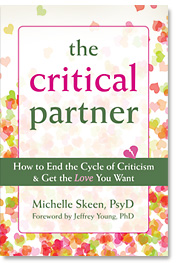 My guest for this week is Michelle Skeen… yes, I will be host and guest! I will also have a close friend of mine on my show (I will reveal his name at the beginning of the show). Over the last month, I have been having frequent conversations with people about the subject of my book The Critical Partner. It has become clear to me that there are many people who feel trapped in the role of the “critical” partner and they truly want to end the toxic role that they play in their relationship. So, I will be discussing the primary schemas that trigger this behavior as well as the alternative coping strategies that can help them move on from their maladaptive behavior.
My guest for this week is Michelle Skeen… yes, I will be host and guest! I will also have a close friend of mine on my show (I will reveal his name at the beginning of the show). Over the last month, I have been having frequent conversations with people about the subject of my book The Critical Partner. It has become clear to me that there are many people who feel trapped in the role of the “critical” partner and they truly want to end the toxic role that they play in their relationship. So, I will be discussing the primary schemas that trigger this behavior as well as the alternative coping strategies that can help them move on from their maladaptive behavior.
More about The Critical Partner
Modern Love and Schemas
New York Times Sunday Style Section
Modern Love Column
“What a Scale Can’t Measure” by Paula Derrow (she lives in New York and is the articles director of Self Magazine)
As I was reading this touching account of a “curvy” woman who dated an “overweight-obese, by clinical standards” guy I started thinking about this story in the context of schemas (the framework—developed by Jeffrey Young PhD—that I use in my book, The Critical Partner). With the limited information provided in the article, I would guess that the guy has a defectiveness and shame schema. I imagine that his desire to be in a loving intimate relationship is what led him to post a profile on match.com. In this forum he had the advantage of presenting some of his strengths prior to exposing the part of himself that he felt would make him unlovable to a woman who he would want to be with. He was making an effort to fight against his schema. I don’t want to do the story an injustice by retelling it because Paula Derrow so poignantly tells it, but it seems that after they became sexually intimate and he exposed the part of himself that made him feel unlovable he pulled away from Paula. She did not pull away from him. Her behavior toward him was accepting—it did not reinforce his schema. But he couldn’t overcome the power of his schema, so he canceled dates with her until he finally told her that he didn’t have the energy. By ending the relationship with Paula he employed the schema coping behavior called “avoidance.”
Schema avoidance behavior is a short-term solution for avoiding the pain that a person experiences when their schema gets triggered. In the long-term it doesn’t get them any closer to getting their emotional needs met because they are withdrawing from important aspects that make for a full and happy life.
Think about some of your relationships or dating experiences in the context of schemas. Does Paula’s experience resonate with you?
Finding a Good Therapist
Wall Street Journal
“Help Wanted: A Good Therapist” by Melinda Beck
I think that this article will resonate with many of you who have experience with therapists and it will provide helpful suggestions for those of you who are thinking about starting therapy or looking for a therapist.
According to a 2007 statistic, 9 million Americans or 3% of the population had out-patient therapy.
Finding a therapist who is a good fit can be challenging. I was reminded of this during a recent conversation with someone who was recounting his therapist experiences and what has worked for him including coping strategies that he still utilizes when he is struggling.
In the article, Melinda Beck explains that “therapy can be painful, particularly if you are confronting fears or reopening old wounds. So, if you have a therapist who is “too hard” and “you dread every session or feel the therapist isn’t empathetic, it may be a bad fit.” Conversely, a therapist who is “too soft” may not be a good fit either. “The therapist shouldn’t be your best friend. Supportive listening can be soothing, but if the therapy doesn’t challenge your thinking and push you to change, you may not make much progress.” The most successful therapy—“the right fit”—occurs when it is collaboration—“the patient and therapist often agree on a diagnosis, share insights and set measurable goals. You should feel connected intellectually and emotionally and comfortable enough to make changes.”
 About the book: Everyone thrives on love, comfort, and the safety of family, friends, and community. But if you are denied these basic comforts early in life, whether through a lack of physical affection or emotional bonding, you may develop intense fears of abandonment that can last well into adulthood―fears so powerful that they can actually cause you to push people away. If you suffer from fears of abandonment, you may have underlying feelings of anger, shame, fear, anxiety, depression, and grief. These emotions are intense and painful, and when they surface they can lead to a number of negative behaviors, such as jealousy, clinging, and emotional blackmail. In Love Me, Don’t Leave Me, therapist Michelle Skeen combines acceptance and commitment therapy (ACT), schema therapy, and dialectical behavioral therapy (DBT) to help you identify the root of your fears. In this book you’ll learn how schema coping behaviors―deeply entrenched and automatic behaviors rooted in childhood experiences and fears―can take over and cause you to inadvertently sabotage your relationships. By recognizing these coping behaviors and understanding their cause, you will not only gain powerful insights into your own mind, but also into the minds of those around you. If you are ready to break the self-fulfilling cycle of mistrust, clinginess, and heartbreak and start building lasting, trusting relationships, this book will be your guide.
About the book: Everyone thrives on love, comfort, and the safety of family, friends, and community. But if you are denied these basic comforts early in life, whether through a lack of physical affection or emotional bonding, you may develop intense fears of abandonment that can last well into adulthood―fears so powerful that they can actually cause you to push people away. If you suffer from fears of abandonment, you may have underlying feelings of anger, shame, fear, anxiety, depression, and grief. These emotions are intense and painful, and when they surface they can lead to a number of negative behaviors, such as jealousy, clinging, and emotional blackmail. In Love Me, Don’t Leave Me, therapist Michelle Skeen combines acceptance and commitment therapy (ACT), schema therapy, and dialectical behavioral therapy (DBT) to help you identify the root of your fears. In this book you’ll learn how schema coping behaviors―deeply entrenched and automatic behaviors rooted in childhood experiences and fears―can take over and cause you to inadvertently sabotage your relationships. By recognizing these coping behaviors and understanding their cause, you will not only gain powerful insights into your own mind, but also into the minds of those around you. If you are ready to break the self-fulfilling cycle of mistrust, clinginess, and heartbreak and start building lasting, trusting relationships, this book will be your guide.




